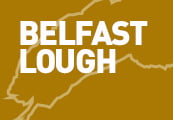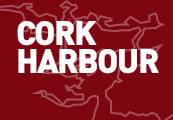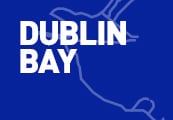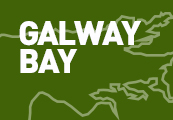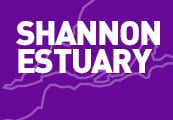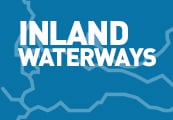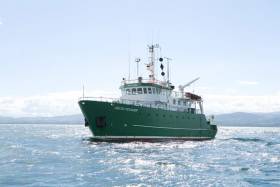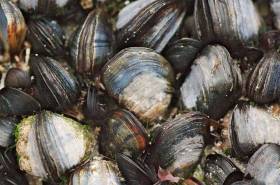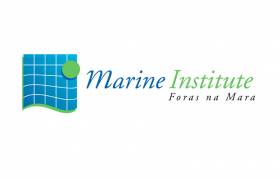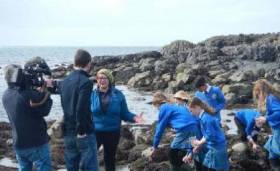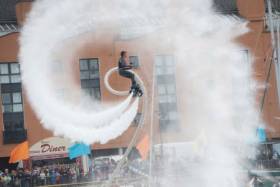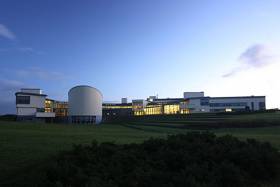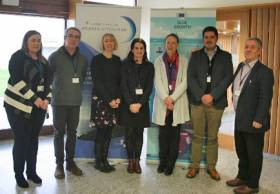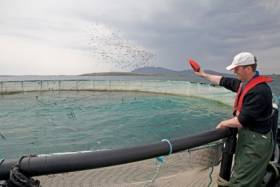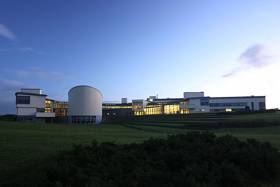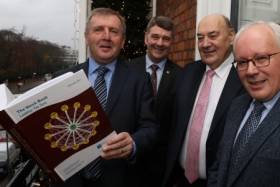Displaying items by tag: Marine Institute
Open Call For Training Through Research Surveys In 2018
#MarineScience - The call for applicants to take part in Training Through Research Surveys (TTRS) is now open to graduate and postgraduate students from across Ireland.
TTRS is a collaboration between the Strategic Marine Alliance for Research & Training (SMART) and the Marine Institute, which aims to increase national capacity in offshore marine research by providing placements on a range of dedicated research surveys.
TTRS surveys give students the opportunity to develop their careers in ocean science and gain hands-on research experience on board the Marine Institute’s research vessels, RV Celtic Explorer and RV Celtic Voyager.
Students can develop the skills required to work at sea including using advanced and up-to-date equipment and instrumentation as well as collecting and handling data.
Taking part in a TTRS survey enables students to establish new professional contacts with experienced scientists and researchers, as well as make a real contribution to the survey goals.
This year’s TTRS surveys are as follows:
- Anglerfish and megrim survey: Legs 1 (19-27 February), 2 (27 February-8 March), 3 (9-19 March) and 4 (10-20 April)
- Blue whiting acoustic survey (20 March-9 April)
- INFOMAR hydrographic survey (21 April-13 May)
- Western European Shelf Pelagic Acoustic Survey (WESPAS) Legs 1 (9-18 June) and 2 (3-24 July)
- Celtic Sea herring acoustic survey (7-27 October)
To take part in a TTRS survey, visit the Smart Sea School website and complete an online application form. To read previous participants' experience of TTRS, visit the SMART blog.
Applicants for Training Through Research Surveys:
- must hold a degree in marine-related science or technology or be in the final year of their undergraduate programme.
- must hold a valid ENG11 medical certificate and a Personal Survival Techniques (PST) certificate (STCW95).
- should have some prior seagoing experience.
Please note that ENG11 medical certificates must be renewed every two years and PST certification renewed every five years.
Information on obtaining medical and sea-survival certificates, and check lists for scientists embarking on national research vessels is available from the Vessel User Information page on the Marine Institute website.
TTRS participants are responsible for costs incurred in travelling to and from survey ports. For queries please contact [email protected].
TTRS surveys are supported by the Marine Institute. Grant-aided ship time is carried out under the Strategic Marine Research & Innovation Agenda of the Integrated Marine Plan for Ireland (Harnessing Our Ocean Wealth) under the Marine Research sub-programme of the Irish Government.
Participation in surveys is by kind agreement with the survey chief scientist. Applications are invited from graduate and postgraduate students of Ireland of Ireland higher education institutions.
Marine Institute Leads New Project In Predicting Shellfish Safety
#Shellfish - Predicting risk and impact of harmful algal bloom events that cause impact to the shellfish aquaculture sector (PRIMROSE) is a new €2.7-million marine science project led by the Marine Institute.
The project is funded by the Interreg Atlantic Area Operational Programme and includes 10 research and SME partners from five countries along the Atlantic Arc from southern Spain to the Shetland Islands.
During the next three years, the PRIMROSE project will form a network of scientists and industry members to produce an inter-regional toxin and microbiological advisory and forecasting capability to the European aquaculture industry.
“The project will produce applications based on reusing existing monitoring data, modelled coastal hydrodynamics, satellite and other novel aerial observations, meteorological, historical and recent trend data to predict and give early warning of toxic blooms and elevated microbiological events,” said project coordinator Joe Silke, from the Marine Institute.
“This will allow fish and shellfish farmers to adapt their culture and harvesting practices in time, in order to reduce potential losses.”
The Marine Institute will implement the lead role of co-ordinating the project and ensure that all the work packages, actions, deliverables and results are achieved.
Already a strong partnership approach has been established during the project preparation. By consolidating and further developing the regional knowledge capital that exists, the consortium is confident of a successful outcome.
Partners will participate in a suite of six work packages and will develop a sustainable product that will be largely automated to predict and produce regular published reports for the long term once the project is finished.
In recent years, there has been much discussion of satellites being able to track surface algal blooms. Understanding biological phenomena in the ocean requires a complex approach, though there is some merit in using satellite derived chlorophyll images to delineate high biomass near surface algal blooms.
Much cutting edge harmful algal bloom research work has focused on subsurface profiles, where certain species are present in thin layers of limited geographical extent often associated with strong density interfaces. Phytoplankton blooms, micro-algal blooms, toxic algae, red tides, or harmful algae, are all terms for naturally occurring phenomena.
Clearly, in order for a toxic, harmful algal bloom, or a microbiological forecast to be realistic, physical factors including changes in water column structure and transport pathways are necessary.
“PRIMROSE is the next step towards providing an operational advisory service by integrating physical oceanographic drivers with a variety of biotoxin, phytoplankton count and microbiological data,” said Silke. “A distributed advisory service and a network of thematic experts distributed across the participating countries will then network to provide regular advisory products and forecasts of impending toxic and harmful algal events.”
PRIMROSE brings together experts in the areas of modelling, Earth observation, harmful algal bloom and microbiological monitoring programmes and end users to assemble a number of key data sets and build upon and explore new forecasting options.
The consortium includes three UK partners (Seafood Shetland, Scottish Association for Marine Science and Plymouth Marine Lab) two Irish partners (Marine Institute and Bantry Marine Research Station), one partner in France (IFREMER), three in Spain (AZTI, Instituto Oceanographico Espanol and AGAPA) and one in Portugal (Institute Technico Superior/University of Lisboa).
The Marine Institute recently issued a recruitment call for a data analyst and project co-ordinator for the PRIMROSE project, as previously reported on Afloat.ie.
Closing Dates Approaching For Temporary Research & Admin Roles With Marine Institute
#Jobs - The closing dates for applications are approaching for number of temporary research and administrative vacancies with the Marine Institute.
A self-motivated, enthusiastic and experienced Administrative Assistant (Executive Officer) is being sought to ensure high quality, timely and accurate reporting for Oceanographic Services (OS) EU-funded projects over a three-year period. Applications close at noon tomorrow, Thursday 4 January.
Next Monday 8 January is the closing date for two roles with the PRIMROSE (Predicting risk and impact of harmful algal bloom events that cause impact to the shellfish aquaculture sector) project.
A Post-Doctoral Data Analyst is sight to develop a string scientific partnership between the members of the INTERREG Atlantic Area Funded project consortium across Europe. The successful candidate will also be expected to develop and deliver scientific presentations at international conferences during the project.
The post-doc research assistant will also be aided by a Temporary Scientific & Technical Officer Project Coordinator, who will track and report the progress of the project’s work as well as develop a high level of knowledge in the technical areas of Harmful Algal Bloom science and forecasting.
Applications will be accepted till noon on Thursday 11 January for the role of Temporary Administrative Assistant (Executive Officer) with the Office of Research and Development.
The successful applicant will have with primary responsibility for supporting financial and administrative reporting for Marine Institute participation in the EU INTERREG projects, Compass (for a monitoring buoy network between Britain and Ireland) and Bluefish (to develop knowledge and understanding of the marine resources of the Irish Sea and Celtic Seas and the related impact of climate change).
2017 a Successful Year of Increasing Ocean Literacy in Irish Primary Schools
#MarineScience - Delivered by ten centres around Ireland is The Explorers Education Programme, that met up to 15,000 primary school students, worked with over 500 school teachers and trained in excess of 100 teachers and student teachers on the east and west coasts.
In addition the Programme generated attendance from several public events reaching over 300,000 people throughout the country in 2017.
Dr Peter Heffernan, CEO, Marine Institute congratulated the centres representing the Explorers Education Programme on their delivery and supporting the Governments national marine strategy Harnessing Our Ocean Wealth, "where one of its goals is to increase Ireland's engagement with the sea. A wave of ocean literacy has hit our shores this year, and it has been incredible to see the Explorers programme go from strength to strength over the last ten years from where we started with ten schools and now are reaching 500 around the country this year. The positive feedback from the teachers and their wider communities about student's eagerness to learn about the ocean reinforces the importance of reaching out to primary schools to help build our marine science capital."
As part of the Explorers Programme interactive marine based modules are introduced in classes that include aquariums in the class, seashore safari's, and a range of marine based projects learning about marine biodiversity, marine environmental awareness and care, marine history as well as marine technology. "Over the last year we have worked with teachers assessing the level of awareness, engagement, and ocean literacy in the classroom and have seen a significant increase in the student's knowledge about the ocean around them," explained Cushla Dromgool-Regan at the Marine Institute.
"The Explorer centres midyear results showed an increase from 59% to 85% in primary school children's knowledge about the ocean nationally, which was amazing, and is a great reflection on the team of outreach officers who are visiting the schools. We are very proud to have supported the Explorers outreach centres around the country who have reached a record number of participants this year" added Cushla Dromgool-Regan.
The Explorers Education Programme aims to help promote learning and increasing our knowledge about the ocean in our communities. "At a national level the Explorers Education Programme has been recognised by teachers and schools as delivering a programme of high impact where students learn about ocean through cross curricular activities ranging from the arts to the sciences. Often the Explorer programme brings out new ideas and team work amongst the students that teachers also get inspiration from," explained Dr Noirin Burke, Galway Atlantaquaria.
The Explorers modules and resources are used to support teachers in achieving their curriculum objectives and can also help schools develop strategies for teaching sustainability topics and hands-on inquiry based lessons which are inclusive of all students needs in the classroom " Dr Noirin Burke further added.
The Explorers Education Programme is supported by the Marine Institute, and is funded under the Marine Research Programme by the Irish Government and is available for schools to take part in throughout a number of coastal counties in Ireland. For more information please visit www.explorers.ie
Returning to Galway - Fun, Family Friendly Events at SeaFest 2018
#Seafest2018 - Returning to Galway in 2018 will be Seafest, Ireland's biggest and most spectacular maritime festival.
For three days SeaFest 2018 take place from from 29th June to 1st July – a weekend of fun, family friendly events not to be missed.
More than 100,000 visitors flocked to Galway Harbour to enjoy a host of activities and entertainment on and around the water for SeaFest 2017. World Champion Flyboarders performed breath-taking aerial acrobatics in the heart of Galway's ship-filled harbour. There were open tours of the tall ship The Phoenix, Irish naval vessel LÉ Ciara, and the Marine Institute's research vessel RV Celtic Explorer. Visitors also took to the water and gave kayaking and sailing a go with the Irish Sailing Association offering disabled access to budding sailors.
BIM and Bord Bia hosted a showcase of Irish seafood with live cookery and fishmongery demonstrations, as well as interactive exhibits and displays of live fish and shellfish species. A huge display from the Defence Forces was popular with the young and the young at heart. The LookWest.ie Marquee hosted talks from marine-inspired entrepreneurs based in the West of Ireland.
The dedicated Kids Zone kept little hands busy with art and craft workshops, storytelling sessions and face-painting. The festival programme also included the interactive gallery, The Wild Atlantic – Sea Science, at Galway City Museum and an exhibition on polar explorer Roald Amundsen at NUI Galway.
SeaFest deepens our knowledge and appreciation of the ocean, celebrates our maritime heritage and also generates awareness about Ireland's abundant marine resources.
SeaFest 2018 will aim to build on the entertaining and educational experiences offered at this year's festival.
SeaFest is coordinated by the Marine Institute, on behalf of the Marine Coordination Group. For more information, follow SeaFest on Facebook and Twitter.
€108,000 Awarded To Early-Stage Marine Researchers
#MarineScience - The Marine Institute awarded €108,000 in grant-aid funding to 94 recipients in 2017 under its Networking & Travel Awards.
This scheme, funded under the Marine Research Programme with the support of the Government, makes awards to provide assistance for networking activities that support the goals of the Harnessing Our Ocean Wealth Strategy.
They also constitute an important part of the implementation of the National Marine Research and Innovation Strategy 2017-2021, which was launched in June this year.
The main focus of the Networking & Travel Awards is to give early-stage researchers, post-graduate students, research assistants and intern staff an opportunity to present their marine research to an international audience, network with international marine experts, and promote research carried out in Ireland on the global stage.
Seventy-seven applicants received travel awards for this purpose. A further nine awards were made in support of hosting marine conferences or workshops in Ireland and for the establishment of international networks for leveraging marine funding.
A final eight awards were for the mobility of research expertise by SMEs for the transfer of knowledge in science and technology towards the development of the marine sector.
Since 2014, 41 participating Irish marine organisations have successfully partnered in 77 marine-related EU projects, bringing a minimum of €29.7 million in EU grant-aid to Ireland.
This represents 7% of the total available drawdown for Ireland for a range of research, development and innovation projects.
Next year’s call for the Marine Institute Networking & Travel Awards will open a month from now in mid-January.
#Horizon2020 - This week’s information day on Horizon 2020 as a key investment driver for the marine sector highlighted the importance of ‘blue growth’ as an important opportunity for marine research in Ireland.
Since 2014, 27 Irish marine participating organisations have successfully partnered in 48 marine-related H2020 projects bringing a minimum of €24.9 million in EU grant aid to Ireland.
This competitive record represents 7% of the total available drawdown for Ireland for a range of research, development and innovation projects, well in excess of the juste retour principle.
The Blue Growth Call aims to sustainably harness the potential of resources from seas, oceans and inland waters for different uses and across the range of marine and maritime industries, while protecting biodiversity and enhancing climate resilience.
It supports sustainable growth in the marine and maritime sectors through a responsible management of marine resources for healthy, productive, safe, secure and resilient seas and oceans, which are essential for thriving ecosystems, climate regulation, global food security, human health, livelihoods and economies.
Speaking at the event hosted by the Marine Institute in Oranmore yesterday (Tuesday 12 December), Fiona Grant of the institute stated that “a strategic co-ordinated approach for marine and maritime research across all parts of Horizon 2020 is required as this will support the implementation of relevant EU policies to help deliver key blue growth objectives across Europe.”
A total of €239 million in dedicated blue growth funding is available between 2018 and 2020 to sustainably harvest the potential of aquatic and marine resources, while protecting biodiversity and enhancing climate resilience.
Funding topics relevant to the marine and maritime sectors can be found under the following non-exclusive and non-exhaustive list of societal challenges across a broad range of blue growth areas in work programmes:
- Food Security, Sustainable Agriculture and Forestry, Marine and Maritime and Inland Water Research and the Bioeconomy and related areas.
- Secure, Clean and Efficient Energy.
- Smart, Green and Integrated Transport.
- Climate Action, Environment, Resource Efficiency and Raw Materials.
- Secure Societies - Protecting Freedom and Security of Europe and its Citizens.
Niall McDonough, director of policy, innovation and research support services at the Marine Institute, highlighted “the value of ongoing cooperation on marine and maritime research.
“Ireland has, in recent years, benefited from national and international partnerships, particularly where there have been coordinated approaches in supporting the EU Atlantic Action Plan. Sharing information, costs, results and best practices, as well as generating ideas for further areas of co-operation in maritime activities, is key to developing a sustainable blue economy in Ireland and the EU.”
The support team for the Atlantic Action Plan provided information relating to Horizon 2020 national contact points, developing a winning proposal, the application process as well as innovation and access to risk finance.
Speakers included Joanne Laffey, support team for the Atlantic Action Plan, Marine Institute; Fiona Grant, H2020 NCP for SC2 (Marine), Marine Institute; Phillip Cheasty, NCP for SC3, Enterprise Ireland; Alice Wemaere, NCP for SC5, Environmental Protection Agency; David Murphy, Aqua TT; Seán Burke, NCP for SME Instrument, Enterprise Ireland; and Julie Clarke, Gavin & Doherty Geosolutions.
Connemara ‘Marine Innovation Park’ Preps New Planning Application
#MarineScience - A new planning application is set to be submitted for the proposed ‘marine innovation park’ in Connemara, as Galway Bay FM reports.
Páirc na Mara is envisaged as a low-carbon marine industry hub over nine hectares, with a focus on aquaculture research.
As previously reported on Afloat.ie, the new research cluster would form part of a network including the existing Marine Institute facilities at Newport in Co Mayo.
The deadline for expressions of interest in the revised project is tomorrow, Friday 1 December.
Galway Bay FM has more on the story HERE.
European Association Of Fish Pathologists To Host Third Meeting In Galway Next September
#MarineScience - Following on from the successful conferences in Keele (2014) and Stirling (2016), the Marine Institute in Galway will host the third meeting of the European Association Of Fish Pathologists (EAFP) on 11-12 September 2018.
‘Connecting academia with industry for improved aquatic animal health’ is the theme of next year’s meeting, which will focus on the latest scientific advances and how this can be applied to the crustacean, molluscan and finfish aquaculture industries to improve the health of such marine wildlife.
The meeting will open with a keynote lecture followed by specific sessions on topics relevant to the UK and Ireland. Early stage researchers (post-graduate students, PhDs) will also get the opportunity to present their work in a dedicated session.
Registration for this event will open in early 2018. More announcements will follow on the EAFP website. For queries contact Dr Neil Ruane at [email protected].
Marine Minister Receives Annual Fish Stock Book
#Fishing - Marine Minister today (Tuesday 28 November) received the Marine Institute’s annual Stock Book for 2017.
The Stock Book, one of the principal annual publications of the Marine Institute, provides the latest impartial scientific advice on commercially exploited fish stocks of interest to Ireland.
Provididing the latest scientific advice for 61 fish stocks, the publication is used by the Department of Agriculture, Food and the Marine at the annual quota negotiations with the EU in December of each year and throughout the year at fisheries management meetings.
"The information presented by the Marine Institute in the Stock Book is critical to the preparations for the annual fisheries negotiations which are coming up in the next fortnight,” said Minister Creed.
“The detailed stock-by-stock guide ensures we have the most up to date scientific advice at our finger tips. The fishing industry is a vital part of Ireland's coastal economy, with Ireland’s quotas worth approximately €226 million in 2017.”
Marine Institute chief executive Dr Peter Heffernan added: “The seas around Ireland are among the most productive and biologically sensitive areas in EU waters. Our fisheries scientists spend collectively over 1,000 scientific days each year at sea on the Marine Institute's two research vessels, surveying fish stocks and habitats so that we can have the best available information on the state of our stocks.
“Throughout the year our scientists also participate in and lead ICES working groups on international fish stocks in order to maintain healthy ocean ecosystems and sustain Ireland’s important blue economy.”
Throughout the year the Stock Book also serves as a valuable reference to a wide audience, including the fishing industry, managers, marine scientists, environmental NGOs, third level institutes, financial institutions and those with an interest in the status and management of marine fisheries resources in the waters around Ireland.
The Stock Book is available electronically on the Marine Institute’s website.

